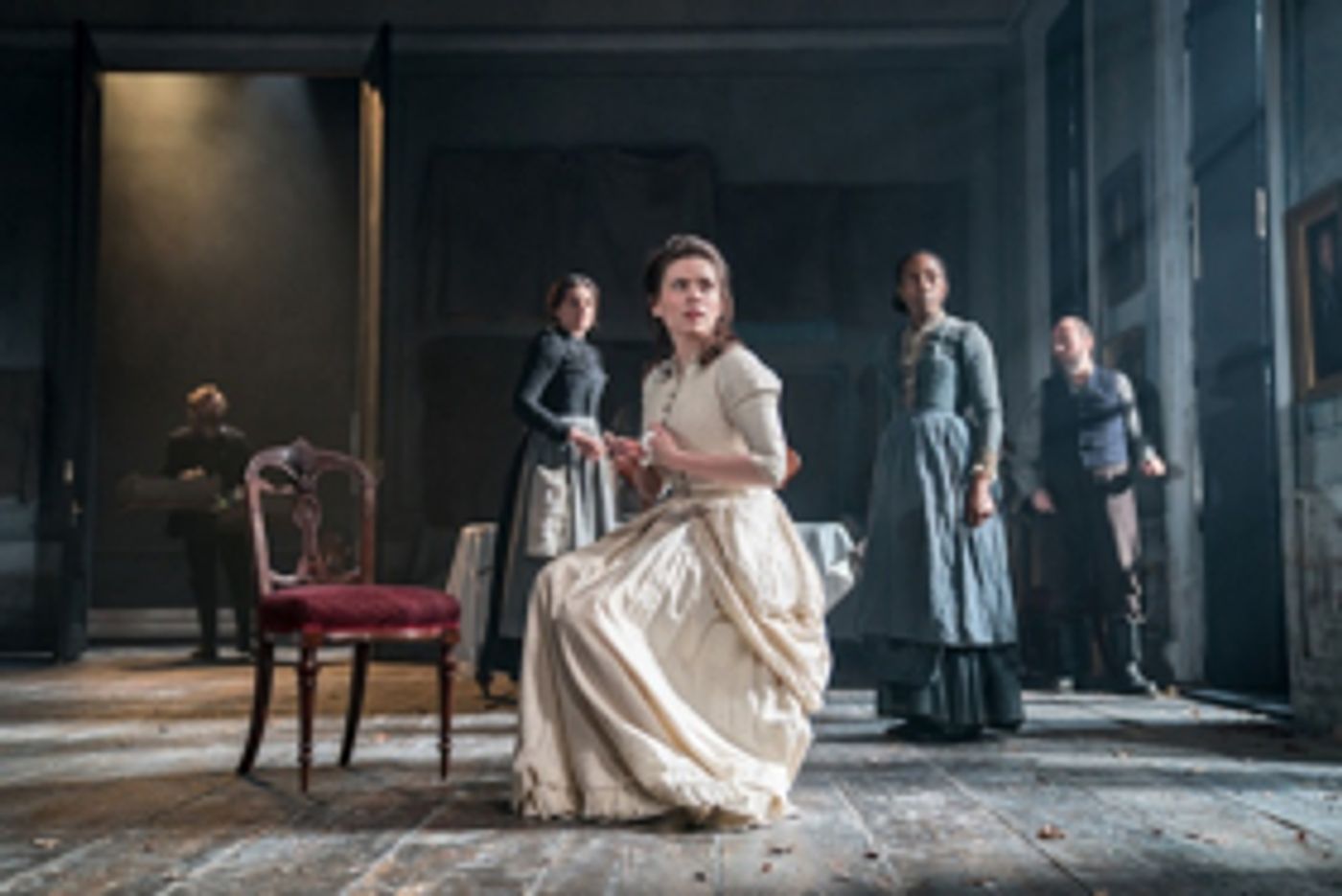Review: ROSMERSHOLM, Duke of York's Theatre
![]() As politicians and pundits dissect the local election results, Duncan Macmillan serves up a blistering new adaptation of an 1886 work that feels eerily like a 2019 commentary. Move over, James Graham - it turns out Ibsen has supplied the political play for today.
As politicians and pundits dissect the local election results, Duncan Macmillan serves up a blistering new adaptation of an 1886 work that feels eerily like a 2019 commentary. Move over, James Graham - it turns out Ibsen has supplied the political play for today.
 John Rosmer is a former pastor and the inheritor of a noble name, estate and significant local influence. His forefathers are continually present in intimidatingly large, dour portraits, and his brother-in-law Kroll urges him to protect the country's traditions - and its ruling class - by supporting the conservatives in the upcoming election.
John Rosmer is a former pastor and the inheritor of a noble name, estate and significant local influence. His forefathers are continually present in intimidatingly large, dour portraits, and his brother-in-law Kroll urges him to protect the country's traditions - and its ruling class - by supporting the conservatives in the upcoming election.
But Rosmer has been swayed by Rebecca West, the former companion of his late wife Beth, who has stayed on in the house and shared her vision of social equality. Rosmer has since rejected both his faith and his former allegiance to the nobility, seeing his inheritance as "a vast moral debt", gained via the suffering of others.
Macmillan's version, fluidly directed by Ian Rickson, is full of witty contemporary echoes. Kroll fears giving the public power to vote against their own interests, duped by the press (hello, Brexit), and envisions a doomed electoral discourse based on "feelings, not facts". However, Kroll has bought the rival paper to the firebrand liberal one, and wants to use it to sway public opinion - even if it means digging up scandalous dirt.
The intersection of political and personal looms large. Kroll equates Rosmer's changed ideas with moral failings: his rejection of the church, and the supposed impropriety of his relationship with Rebecca, "a liberated woman". He also judges the radical newspaper publisher for a past scandal - Mortensgaard had a child out of wedlock with a married woman, and was ostracised when Rosmer outed him to the congregation.
Class distinctions are always present. As Rosmer makes proclamations about ennobling the poor, silent servants prepare dinner, tidy the room, and observe this elite group discussing reforms that could change their lives. It's also implied that the family fortune was built partly on slavery; a black servant hesitates in the doorway as an ashamed Rosmer refers to it.
Kroll, meanwhile, sees his allegiance with traditional institutions as proof of his just stance; he's a churchgoer, leads the temperance group, and is loyal to his class and to his country's history and established "values". Yet, ironically, his own children have taken up the liberal cause.
Hamilton star Giles Terera is superb as the mannered, image-conscious Kroll, driven by the evangelical zeal of a recent convert to active political life, and often declaiming as though quoting a stump speech. He dismisses Rebecca's ideas with casual disdain - after all, women can't vote, so why should they have opinions? - and clings to his righteousness when challenged by his friend's new idealism.
As his polar opposite, Hayley Atwell provides a Rebecca who seems constantly constricted - by her formal clothing, by the stifling room (every time she opens a window, someone else closes it), by social etiquette, and by the limitations placed upon her as a woman.
Yet when she's in full flow, her burning conviction is exhilarating: the sharp intelligence, wit and true belief in what Kroll disgustedly terms "radical compassion". Both carry personal biases - Kroll notes her perspective has been shaped by poverty; she points out his has by privilege - but Atwell makes her a complex, compelling figure, someone with all the qualities of a great leader in another life or another time.
Tom Burke has the trickier task of making Rosmer more than just a vessel for other people's ideas, or a symbol for the country overwhelmed by political infighting. Unlike Rebecca, he's not a natural revolutionary, though he's come to understand that even taking a "neutral" stance means picking a side. Yet panic overtakes him, and the past retains more of a grip than any dream of the future.
Rae Smith's austere, painterly design is like a crumbling mausoleum, and Neil Austin's expressive light - filtered through the dirty, rain-streaked windows - is eerily effective in suggesting that local gossip about ghosts haunting the house might have some foundation. The armchair where Rosmer's wife Beth habitually sat, before she committed suicide, is often picked out in a beam of chilly sunlight, keeping her present.
The second half is more melodramatic, with a stream of sensational revelations, and romantic desire and guilt crowding out political convictions. It's the more conventional version of this drama, and though Burke and Atwell play the torment of it well, the latter's hint of steely ruthlessness - in the name of the greater good - is the far more interesting component.
There's excellent support from Peter Wight as Rosmer's former liberal tutor-turned-shambolic drinker, a brilliantly tragicomic portrait; Jake Fairbrother as the pragmatic liberal publisher, coolly weighing up Rosmer's use to his cause, as Rosmer once judged him; and Lucy Briers as the all-seeing housekeeper.
The latter's exchanges with Atwell's Rebecca are riveting - these two women who can only wield power and influence through men. Again, that feels like an element worth exploring further, and the vitality of Atwell's performance somewhat eclipses her male co-stars. But this is still a deft revival, mining a classic work for gripping modern drama.
Rosmersholm at the Duke of York's Theatre until 20 July
Photo credit: Johan Persson
Reader Reviews
Powered by
|
Videos

